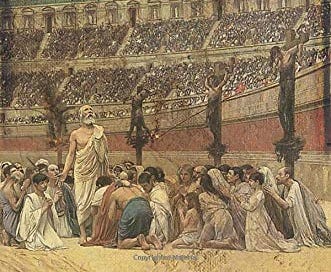If you are looking for the beginning of the study for Eusebius’ Church History then you can go HERE for a brief introduction. At the bottom of the introduction you will find the links to each section of the study guide as it becomes available. If you would like to see the growing list of book studies available for free on this site you can go HERE. Enjoy!
Virtues/Vices/Great Ideas: (Find them in the Text)
Gullibility, Truth, Love
Grammar Questions: (The Information of the Text)
What academic disciplines did Origen teach besides theology?
What did Porphyry claim about Origen in an attempt to heap scorn upon him?
How did Eusebisus acquire the information he needed to write his church history?
How did Ambrose enable and equip Origen to write his biblical commentaries?
According to Origen, which biblical books were doubted or disputed by some in his day?
What opinion did Origen offer concerning the epistle to the Hebrews concerning its authorship?
According to Eusebius, what had been the case concerning the house of emperor Alexander?
What was Maximinus’ attitude towards Christianity?
How did Fabian become Bishop of Rome?
What false teaching did Beryllus spread for a time and what changed his mind back towards orthodoxy?
Logic Questions: (Interpreting, Comparing/Contrasting, Reasoning)
What kind of “elementary subjects” would be “useful tools for studying the Scripture?”
Based upon the readings so far in Book 6, why might there have been some controversy around appointing Origen as a presbyter?
What accounts for some of the differences in numbering of the Old Testament books between the Hebrew tradition and our contemporary arrangement of 39 books?
What did Origen mean by saying, “I learned by tradition that the four Gospels alone are unquestionable in the church of God.”
What might account for why Maximinus was so hostile to Christianity?
Rhetoric Questions: (The Analysis of Ideas in the Text)
Eusebius, speaking of Porphyry’s attacks on Origen, charges him with lying about Origen. Eusebius comments that “the opponent of Christianity will do anything.” Given the Christian Scriptures’ teaching that followers of Christ ought to be committed to speaking the truth, does this put the believer at a disadvantage when debating with (or defending themselves against) non-Christians? Why or why not?
Origen decided to “probe the opinions of the heretics as well as the philosophers’ claims to speak truth.” Given that there are many opposing voices in the world who all claim to “speak truth,” how can we determine what is and is not true? Are there multiple methods of discerning truth? Are some methods of determining truth more certain than others? Be careful to explain your answers in detail.
Fabian’s election to the bishopric of Rome was brought about by an unusual circumstance. Should Christians take signs like this seriously? How would we determine that something should be taken as a sign from God? What might be the danger in doing so? What ultimately should have the final say about God’s will for his people?
Theological Analysis: (Sola Scriptura)
Read 1 John (at least chapter one), 2 John, and 3 John and do a comparison and contrast. What are notable similarities you see between them? Does anything about 2 and 3 John seem to disagree with 1 John? How does this affect your thinking about the fact that 2 and 3 John were disputed for a time?



